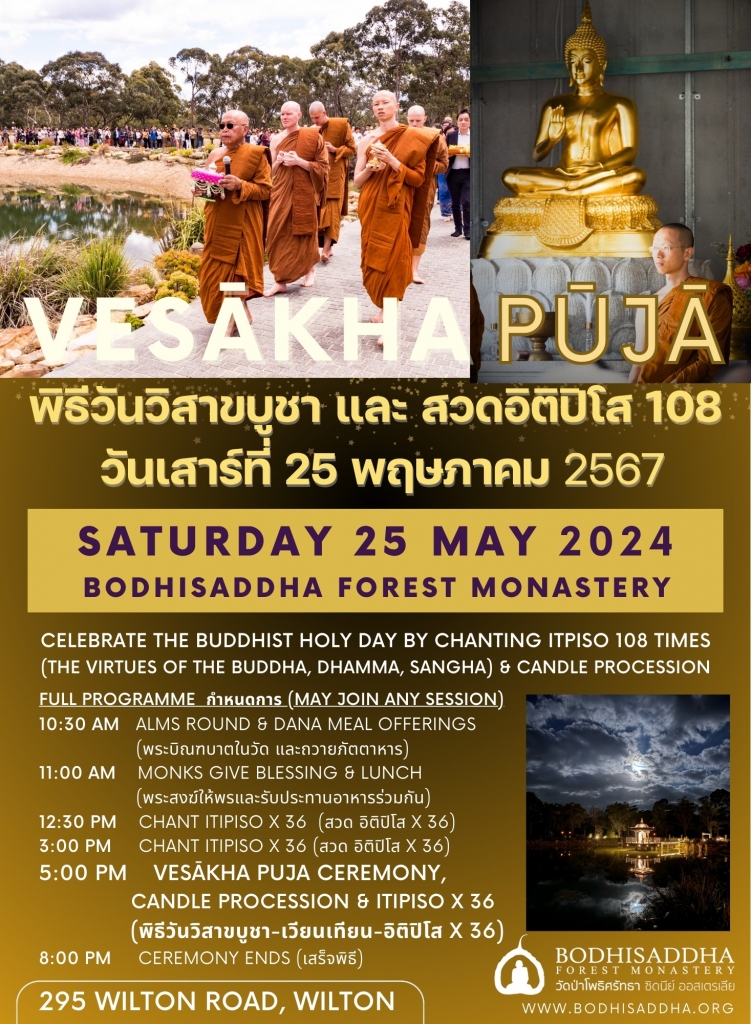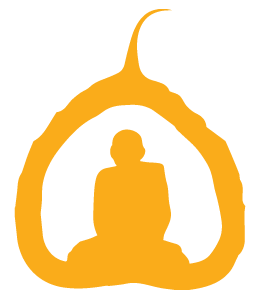Date/Time
Date(s) - Sat, 25 May 2024
10:30 am - 8:00 pm
Location
Bodhisaddha Forest Monastery
Categories

VESĀKHA PŪJĀ CEREMONY
SATURDAY 25 MAY 2024
Bodhisaddha Forest Monastery
Full day programme 10:30am till 8:00pm
Formal Ceremony begins at 5:00pm – 8:00pm
Vesākha Pūjā (Vesak) is the most important Buddhist holy day of the year commemorating the Birth, Enlightenment and Parinibbana of the Perfectly Self-Awakened Buddha.
On this full moon day, you are invited to gather in chanting the praises of the virtues of the Buddha, Dhamma and Sangha 108 times through the day (“Itipiso …”). This will be done in three sessions.
The formal ceremony will begin at 5pm and consist of Evening Chanting, Dhamma talk, Candle Procession, and one session of chanting the virtues of the Buddha, Dhamma, Sangha.
* As the weather is cold and much of the programme is outside, please bring warm clothing.
* Guests who wish to stay overnight and continue practice may ask permission from bodhisaddha@gmail.com a minimum 2 days beforehand. Spaces are limited.
FULL PROGRAMME กำหนดการ (MAY JOIN ANY SESSION)
10:30 AM ALMS ROUND & DANA MEAL OFFERINGS
(พระบิณฑบาตในวัด และถวายภัตตาหาร)
11:00 AM MONKS GIVE BLESSING & LUNCH
(พระสงฆ์ให้พรและรับประทานอาหารร่วมกัน)
12:30 PM CHANT ITIPISO x 36 (สวด อิติปิโส x 36)
3:00 PM CHANT ITIPISO x 36 (สวด อิติปิโส x 36)
5:00 PM VESĀKHA PŪJĀ CEREMONY,
CANDLE PROCESSION & ITIPISO x 36
(พิธีวันวิสาขบูชา-เวียนเทียน-อิติปิโส x 36)
8:00 PM CEREMONY ENDS (เสร็จพิธี)
From a talk on Visakha Puja by Ajahn Lee Dhammadharo:
“Today, Visakha Puja, is an extremely important day in the Buddhist tradition, for it was on this day that the Buddha was born, and 35 years later awoke to the unexcelled right self-awakening, and another 45 years later passed away into total nibbana. In each case, these events took place on the full-moon day in May, when the moon is in the Visakha asterism, which is why the day is called Visakha Puja.
Every year when this important day comes around again, we Buddhists take the opportunity to pay homage to the Buddha as a way of expressing our gratitude for his goodness. We sacrifice our daily affairs to make merit in a skillful way by doing such things as practicing generosity, observing the precepts, and listening to the Dhamma. This is called paying homage to the virtues of the Triple Gem: the Buddha, Dhamma, and Sangha. The Buddha is like our father, while the Dhamma is like our mother — in that it’s what gives birth to our knowledge of the Buddha’s teachings. At present our father has passed away, leaving only our mother still alive. Both of them have been protecting us, looking after us, so that we’ve been able to stay free and happy up to the present. We’re thus greatly in their debt and should find a way of showing our gratitude in keeping with the fact that we are their children.
Ordinarily, when people’s parents die, they have to cry and lament, wear black, etc., as a way of showing their mourning. On Visakha Puja — which is the anniversary of the day on which our father, the Buddha, passed away — we show our mourning too, but we do it in a different way. Instead of crying, we chant the passages reflecting on the virtues of the Buddha, Dhamma, and Sangha. Instead of dressing up in black, we take off our pretty jewels, go without perfume and cologne, and dress very simply. As for the comfortable beds and mattresses on which we normally lie, we abstain from them. Instead of eating three or four times a day, as we normally like to do, we cut back to only two times or one. We have to give up our habitual pleasures if we’re going to show our mourning for the Buddha — our father — in a sincere and genuine way.
In addition to this, we bring flowers, candles, and incense to offer in homage to the Buddha, Dhamma, and Sangha. This is called amisa-puja, or material homage. This is a form of practice on the external level — a matter of our words and deeds. It comes under the headings of generosity and virtue, but doesn’t count as the highest form of homage. There’s still another level of homage — patipatti-puja, or homage through the practice — which the Buddha said was supreme: i.e., meditation, or the development of the mind so that it can stand firmly in its own inner goodness, independent of any and all outside objects. This is the crucial point that the Buddha wanted us to focus on as much as possible, for this kind of practice was what enabled him to reach the highest attainment, becoming a Rightly Self-awakened Buddha, and enabled many of his noble disciples to become arahants as well. So we should all take an interest and set our minds on following their example, as a way of following the footsteps of our father and mother. In this way we can be called their grateful, loyal heirs, because we listen respectfully to our parents’ teachings and put them into practice.”
Read the rest at https://www.accesstoinsight.org/lib/thai/lee/visakha.html

